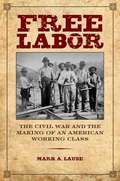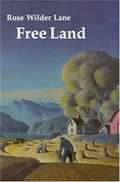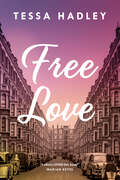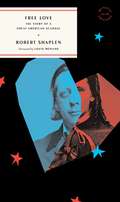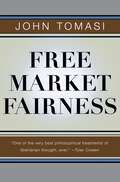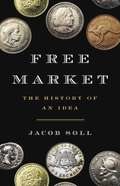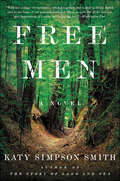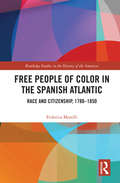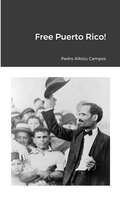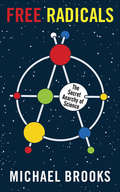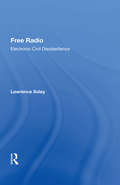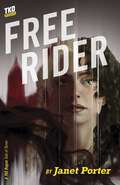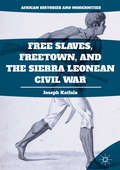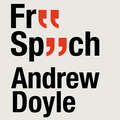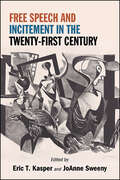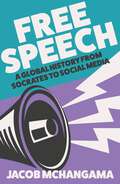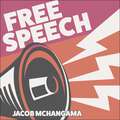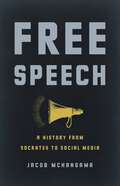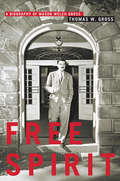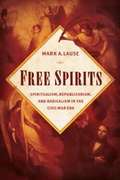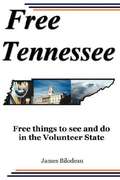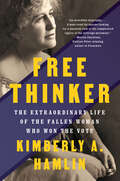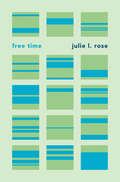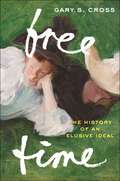- Table View
- List View
Free Labor: The Civil War and the Making of an American Working Class
by Mark A. LauseMonumental and revelatory, Free Labor explores labor activism throughout the country during a period of incredible diversity and fluidity: the American Civil War. Mark A. Lause describes how the working class radicalized during the war as a response to economic crisis, the political opportunity created by the election of Abraham Lincoln, and the ideology of free labor and abolition. Grappling with a broad array of organizations, tactics, and settings, Lause portrays not only the widely known leaders and theoreticians, but also the unsung workers who struggled on the battlefield and the picket line. His close attention to women and African Americans, meanwhile, dismantles notions of the working class as synonymous with whiteness and maleness. In addition, Lause offers a nuanced consideration of race's role in the politics of national labor organizations, in segregated industries in the border North and South, and in black resistance in the secessionist South, creatively reading self-emancipation as the largest general strike in U.S. history.
Free Land
by Rose Wilder Lane(back of book) In the 1880s, when adventure lay in the conquest of the prairies, David Beaton and his bride came to Dakota to claim three hundred acres of grassland. Rose Wilder Lane tells of their struggle to survive with such force that Free Land has become a classic frontier novel. The young couple experience cyclones, droughts, and blizzards that isolate them for days in their sod shanty and endanger their livestock. The simple pleasures of home cooking, horse trading, and socializing interrupt work, here described in its wealth of variety. In every detail, Free Land comes to life because Lane grew up in the time and place of which she writes. The book embodies her belief that "living is never easy, that all human history is a record of achievement in disaster, and that our great asset is the valor of the American spirit."
Free Love
by Tessa HadleyA compulsive new novel about one woman&’s sexual and intellectual awakening in 1960s London.1967. While London comes alive with the new youth revolution, the suburban Fischer family seems to belong to an older world of conventional stability: pretty, dutiful homemaker Phyllis is married to Roger, a devoted father with a career in the Foreign Office. Their children are Colette, a bookish teenager, and Hugh, the golden boy.But when the twenty-something son of an old friend pays the Fischers a visit one hot summer evening, and kisses Phyllis in the dark garden after dinner, something in her catches fire. Newly awake to the world, Phyllis makes a choice that defies all expectations of her as a wife and a mother. Nothing in these ordinary lives is so ordinary after all, it turns out, as the family&’s upheaval mirrors the dramatic transformation of the society around them.With scalpel-sharp insight, Tessa Hadley explores her characters&’ inner worlds, laying bare their fears and longings. Daring and sensual, Free Love is an enthralling, irresistible exploration of romantic love, sexual freedom and living out the truest and most meaningful version of our lives.
Free Love: The Story of a Great American Scandal (McNally Editions)
by Robert ShaplenA wry, instructive, and hugely entertaining account of &“one of the most sensational trials in American history&” (New York Times Book Review).On the night of July 3, 1870, Elizabeth Tilton confessed to her husband that she&’d had an affair with their pastor, Henry Ward Beecher. This secret would soon transfix America, for Beecher was the most famous preacher of the day, founder of the most fashionable church in Brooklyn Heights, a presidential hopeful, an influential supporter of Abolition, and a leader of the campaign for women&’s suffrage. When Beecher tried to silence the Tiltons, it was a whisper network of suffragists, notably Susan B. Anthony and Elizabeth Cady Stanton, who spread news of the affair, and it was the radical Victoria Woodhull—an outspoken proponent of &“free love&”—who seized on it, as political dynamite, to blow up the myth of monogamy among the political elite. Her public accusations led to even more public trials, which shocked the country and divided the most progressive thinkers of the era. In 1953, the journalist Robert Shaplen revisited the Tilton-Beecher affair in a series of articles for the New Yorker, relying on 3,000 pages of contemporary accounts—court transcripts, love-letters, newspaper reports and illustrations, even political cartoons—to reanimate a scandal that shook the American reform movement and to expose a strand of America&’s cultural DNA that remains recognizable today.
Free Market Fairness
by John TomasiA provocative new vision of free market capitalism that achieves liberal ends by libertarian meansCan libertarians care about social justice? In Free Market Fairness, John Tomasi argues that they can and should. Drawing simultaneously on moral insights from defenders of economic liberty such as F. A. Hayek and advocates of social justice such as John Rawls, Tomasi presents a new theory of liberal justice. This theory, free market fairness, is committed to both limited government and the material betterment of the poor. Unlike traditional libertarians, Tomasi argues that property rights are best defended not in terms of self-ownership or economic efficiency but as requirements of democratic legitimacy. At the same time, he encourages egalitarians concerned about social justice to listen more sympathetically to the claims ordinary citizens make about the importance of private economic liberty in their daily lives. In place of the familiar social democratic interpretations of social justice, Tomasi offers a "market democratic" conception of social justice: free market fairness. Tomasi argues that free market fairness, with its twin commitment to economic liberty and a fair distribution of goods and opportunities, is a morally superior account of liberal justice. Free market fairness is also a distinctively American ideal. It extends the notion, prominent in America's founding period, that protection of property and promotion of real opportunity are indivisible goals. Indeed, according to Tomasi, free market fairness is social justice, American style.Provocative and vigorously argued, Free Market Fairness offers a bold new way of thinking about politics, economics, and justice—one that will challenge readers on both the left and right.
Free Market: The History of an Idea
by Jacob SollFrom a MacArthur &“Genius,&” an intellectual history of the free market, from ancient Rome to the twenty-first centuryAfter two government bailouts of the US economy in less than twenty years, free market ideology is due for serious reappraisal. In Free Market, Jacob Soll details how we got to this current crisis, and how we can find our way out by looking to earlier iterations of free market thought. Contrary to popular narratives, early market theorists believed that states had an important role in building and maintaining free markets. But in the eighteenth century, thinkers insisted on free markets without state intervention, leading to a tradition of ideological brittleness. That tradition only calcified in the centuries that followed.Tracing the intellectual evolution of the free market from Cicero to Milton Friedman, Soll argues that we need to go back to the origins of free market ideology in order to truly understand it—and to develop new economic concepts to face today&’s challenges.
Free Men: A Novel
by Katy Simpson SmithFrom the author of the highly acclaimed The Story of Land and Sea comes a captivating novel, set in the late eighteenth-century American South, that follows a singular group of companions—an escaped slave, a white orphan, and a Creek Indian—who are being tracked down for murder.In 1788, three men converge in the southern woods of what is now Alabama. Cat, an emotionally scarred white man from South Carolina, is on the run after abandoning his home. Bob is a talkative black man fleeing slavery on a Pensacola sugar plantation, Istillicha, edged out of his Creek town’s leadership, is bound by honor to seek retribution.In the few days they spend together, the makeshift trio commits a shocking murder that soon has the forces of the law bearing down upon them. Sent to pick up their trail, a probing French tracker named Le Clerc must decide which has a greater claim: swift justice, or his own curiosity about how three such disparate, desperate men could act in unison.Katy Simpson Smith skillfully brings into focus men whose lives are both catastrophic and full of hope—and illuminates the lives of the women they left behind. Far from being anomalies, Cat, Bob, and Istillicha are the beating heart of the new America that Le Clerc struggles to comprehend. In these territories caught between European, American, and Native nations, a wilderness exists where four men grapple with the importance of family, the stain of guilt, and the competing forces of power, love, race, and freedom—questions that continue to haunt us today.
Free People of Color in the Spanish Atlantic: Race and Citizenship, 1780–1850
by Federica MorelliThis book grapples with the important contemporary question of the boundaries of citizenship and access to naturalization by analyzing a body of relevant juridical sources, dating from the end of the eighteenth century to the first half of the nineteenth century, concerning the free people of color in late colonial and early independent Spanish America. Their precarious status makes this group a privileged subject to examine the negotiation and formation of racial identity as well as the definition of citizenship requirements in colonial and post-colonial contexts. Based on archival material collected in Spain (Seville and Madrid) and Latin America (Mexico City, Bogotá, Quito, Lima and Buenos Aires), the book demonstrates that the access of free people of color to citizenship both in the late colonial and early independent period was not established by state authorities, but resulted from complex dynamics between the state and the local society.
Free Puerto Rico
by Pedro Albizu CamposPedro Albizu Campos (September 12, 1891 – April 21, 1965) was a Puerto Rican attorney and politician, and the leading figure in the Puerto Rican independence movement. Contained in this volume are the most prescient of his words on Puerto Rico, which to this day remains a subject of the United States of America.
Free Radicals: The Secret Anarchy of Science
by Michael Brooks&“An exuberant tour through the world of scientists behaving badly&” (The New York Times). They may have a public image as cool, logical, levelheaded types. But in reality, scientists will do pretty much anything—take drugs, follow mystical visions, lie, and even cheat—to make a discovery. In Free Radicals, physicist and journalist Michael Brooks seamlessly weaves together true stories of the &“mad, bad and dangerous&” men and women who have revolutionized the scientific world, and offers a fast-paced and thrilling exploration of the real process behind discovery (The Times, London). Brooks also traces the cover-up back to its source: the scientific establishment&’s reaction to the public fear of science after World War II. He argues that it its high time for science to come clean about just how bold and daring scientists really are. &“Not all scientists are nerds. In Free Radicals, physicist Michael Brooks tries to dispel the notion that scientists are stuffy, pen-protector-polishing bookworms.&” —The Washington Post &“Insightful . . . A page-turning, unvarnished look at the all-too-human side of science.&” —Kirkus Reviews
Free Radio: Electronic Civil Disobedience (Critical Studies In Communication And In The Cultural Industries)
by Lawrence SoleyThis book reviews the history of the microradio movement, enabling readers to understand why and how it has captured momentum and power. It discusses the anti-Nazi underground stations and other resistance stations, explaining how previous stations provided vehicles for democratic communications.
Free Rider (TKO Rogue)
by Janet PorterSet in 1970s New York City, this dark coming-of-age thriller follows twin sisters as corruption, decadence, and greed engulf any vestiges of innocence, trust, and security they may have left. Khalika and Violet, twin girls growing up in a privileged hell, are on the cusp of adulthood after barely surviving a childhood that threatened to shred their psyches before devouring them both in a seismic swirl of pure evil. But one of the sisters has a few moves of her own planned, ones that will require the full cooperation of the other . . .
Free Slaves, Freetown, and the Sierra Leonean Civil War
by Joseph KaifalaThis book is a historical narrative of Sierra Leone from the mid-fifteenth century to the end of its civil war in 2002. It entails the history of Sierra Leone from its days as a slave harbor through to its founding as a home for free slaves and toward its political independence and civil war. In 1462, the country was discovered by a Portuguese explorer, Pedro de Sintra, who named it Serra Lyoa (Lion Mountains). The country later became a hub for the Transatlantic Slave Trade. At the end of slavery in England, Sierra Leone was chosen as a home for the Black Poor, free slaves in England after the Somerset ruling. The Black Poor were joined by the Nova Scotians, African-Americans who fought with the British during the American Revolution, the Maroons, rebellious slaves from Jamaica, and Recaptives, freed in enforcement of British antislavery laws. Freetown became a British colony in 1808 and Sierra Leone obtained political independence from Britain in 1961. The development of the country was derailed by the death of its first Prime Minister, Sir Milton Margai, and thirty years after independence the country collapsed into a brutal civil war. This book is a historical narrative covering these periods in Sierra Leonean history.
Free Speech And Why It Matters: Why It Matters
by Andrew Doyle'A fantastically timely book written by one of the smartest thinkers in Britain' Piers Morgan'Impassioned, scholarly and succinct' The TimesFree speech is the bedrock of all our liberties, and yet in recent years it has come to be mistrusted. A new form of social justice activism, which perceives language as potentially violent, has prompted a national debate on where the limitations of acceptable speech should be drawn. Governments throughout Europe have enacted 'hate speech' legislation to curb the dissemination of objectionable ideas, Silicon Valley tech giants are collaborating to ensure that they control the limitations of public discourse, and campaigners in the US are calling for revisions to the First Amendment.However well-intentioned, these trends represent a threat to the freedoms that our ancestors fought and died to secure. In this incisive and fascinating book, Andrew Doyle addresses head-on the most common concerns of free speech sceptics, and offers a timely and robust defence of this most foundational of principles.
Free Speech and Incitement in the Twenty-First Century (SUNY series in American Constitutionalism)
by Eric T. Kasper; JoAnne SweenyExplores the line between free speech protected by the First Amendment and unprotected incitement to imminent lawless action.Free Speech and Incitement in the Twenty-First Century explores the line between free speech and incitement, which is a form of expression not protected by the First Amendment. Incitement occurs when a person intentionally provokes their audience to engage in illegal or violent action that is likely to, or will, occur imminently. This doctrine evolved from World War I through the Cold War and the civil rights movement era, culminating in a test announced by the US Supreme Court in Brandenburg v. Ohio (1969). Since the 1970s, this doctrine has remained largely unchanged by the Supreme Court and, as such, has received relatively little academic or media attention. Since the late 2010s, however, violence at political rallies, armed protests around Confederate statues, social unrest associated with demonstrations against police, and an attack on the US Capitol have led to new incitement cases in the lower courts and an opportunity to examine how incitement is defined and applied. Authors from different perspectives in Free Speech and Incitement in the Twenty-First Century help the reader understand the difference between free speech and incitement.
Free Speech and Unfree News
by Sam LebovicDoes America have a free press? Many who say yes appeal to First Amendment protections against censorship. Sam Lebovic shows that free speech, on its own, is not sufficient to produce a free press and helps us understand the crises that beset the press amid media consolidation, a secretive national security state, and the daily newspaper's decline.
Free Speech: A Global History from Socrates to Social Media
by Jacob MchangamaA global history of free speech, from the ancient world to today.Hailed as the "first freedom," free speech is the bedrock of democracy. But it is a challenging principle, subject to erosion in times of upheaval. Today, in democracies and authoritarian states around the world, it is on the retreat.In Free Speech, Jacob Mchangama traces the riveting legal, political, and cultural history of this idea. Through captivating stories of free speech's many defenders - from the ancient Athenian orator Demosthenes and the ninth-century freethinker al-Razi, to Mary Wollstonecraft, Mahatma Gandhi, Nelson Mandela and modern-day digital activists - Mchangama demonstrates how the free exchange of ideas underlies all intellectual achievement and has enabled the advancement of both freedom and equality worldwide. Yet the desire to restrict speech is also a constant, and he explores how even its champions can be led down this path when the rise of new and contrarian voices challenge power and privilege of all kinds.Meticulously researched, deeply humane and provocative, Free Speech challenges us all to recognise how much we have gained from this principle - and how much we stand to lose without it.
Free Speech: A Global History from Socrates to Social Media
by Jacob MchangamaA global history of free speech, from the ancient world to today.Hailed as the "first freedom," free speech is the bedrock of democracy. But it is a challenging principle, subject to erosion in times of upheaval. Today, in democracies and authoritarian states around the world, it is on the retreat.In Free Speech, Jacob Mchangama traces the riveting legal, political, and cultural history of this idea. Through captivating stories of free speech's many defenders - from the ancient Athenian orator Demosthenes and the ninth-century freethinker al-Razi, to Mary Wollstonecraft, Mahatma Gandhi, Nelson Mandela and modern-day digital activists - Mchangama demonstrates how the free exchange of ideas underlies all intellectual achievement and has enabled the advancement of both freedom and equality worldwide. Yet the desire to restrict speech is also a constant, and he explores how even its champions can be led down this path when the rise of new and contrarian voices challenge power and privilege of all kinds.Meticulously researched, deeply humane and provocative, Free Speech challenges us all to recognise how much we have gained from this principle - and how much we stand to lose without it.(P) 2022 Hodder & Stoughton Limited
Free Speech: A History from Socrates to Social Media
by Jacob Mchangama&“The best history of free speech ever written and the best defense of free speech ever made.&” —P.J. O&’RourkeHailed as the &“first freedom,&” free speech is the bedrock of democracy. But it is a challenging principle, subject to erosion in times of upheaval. Today, in democracies and authoritarian states around the world, it is on the retreat.In Free Speech, Jacob Mchangama traces the riveting legal, political, and cultural history of this idea. Through captivating stories of free speech&’s many defenders—from the ancient Athenian orator Demosthenes and the ninth-century freethinker al-Rāzī, to the anti-lynching crusader Ida B. Wells and modern-day digital activists—Mchangama reveals how the free exchange of ideas underlies all intellectual achievement and has enabled the advancement of both freedom and equality worldwide. Yet the desire to restrict speech, too, is a constant, and he explores how even its champions can be led down this path when the rise of new and contrarian voices challenge power and privilege of all stripes.Meticulously researched and deeply humane, Free Speech demonstrates how much we have gained from this principle—and how much we stand to lose without it.
Free Spirit: A Biography of Mason Welch Gross
by Thomas W. GrossThe Mason Gross School of the Arts in New Brunswick, New Jersey, stands as a memorial to one of Rutgers University’s most influential leaders. Gross started teaching at Rutgers as an assistant professor of philosophy in 1946, but quickly rose through the ranks to become the university’s provost in 1949 and finally its president from 1959 to 1971. He led the university through an era when it experienced both some of its greatest growth and most intense controversies. Free Spirit explores how Gross helped reshape Rutgers from a sleepy college into a world-renowned public research university. It also reveals how he steered the university through the tumult of the Red Scare, civil rights era, and the Vietnam War by taking principled stands in favor of both racial equality and academic freedom. This biography tells the story of how, from an early age, Gross came to believe in the importance of doing what was right, even when the backlash took a toll on his own health. Written by his youngest son Thomas, this book offers a uniquely well-rounded portrait of Gross as both a public figure and a private person. Covering everything from his service in World War II to his stints as a game-show personality, Free Spirit introduces the reader to a remarkable academic leader.
Free Spirits: Spiritualism, Republicanism, and Radicalism in the Civil War Era
by Mark A. LauseOften dismissed as a nineteenth-century curiosity, spiritualism influenced the radical social and political movements of its time. Believers filled the ranks of the Free Democrats, agitated for land and monetary reform, fought for abolition, and held egalitarian leanings that found powerful expression in campaigns for gender and racial equality. In Free Spirits , Mark A. Lause considers spiritualism as a political and cultural force in Civil War-era America. Lause reveals the scope, spread, and influence of the movement, both in its links to reformist causes and its ability to amplify previously marginalized voices. Rooting spiritualism's appeal in the crises of the time, Lause considers how spiritualist influences, through the distillation of the war, forced reassessments of the question of Radical Republicanism and radicalism in general. He also delves into unexplored areas such as the movement's role in Lincoln's reelection and the relationship between Native Americans and spiritualists.
Free Tennessee: Free Things to See and Do in the Volunteer State
by James V. Bilodeau[From the back cover] Free Tennessee Even in this day and age of super corporations, world trade, stock market gambles, and a general preoccupation for wealth - many things are still free. Tourism today is a multi-billion dollar industry, which is growing at a rapid pace. Mega-amusement parks, roadside attractions, and adventures pop up across the countryside daily. Most of the increase in the number of attractions is for-profit ventures, but even in the booming for profit tourism industry there are many opportunities for free entertainment. Free Tennessee will guide you to the best no cost attractions in Tennessee. Not simply a guidebook, Free Tennessee also tells the history about some of the most interesting attractions within the state.
Free Thinker: Sex, Suffrage, And The Extraordinary Life Of Helen Hamilton Gardener
by Kimberly A. HamlinA story of transgression in the face of religious ideology, a sexist scientific establishment, and political resistance to securing women’s right to vote. When Ohio newspapers published the story of Alice Chenoweth’s affair with a married man, she changed her name to Helen Hamilton Gardener, moved to New York, and devoted her life to championing women’s rights and decrying the sexual double standard. She published seven books and countless essays, hobnobbed with the most interesting thinkers of her era, and was celebrated for her audacious ideas and keen wit. Opposed to piety, temperance, and conventional thinking, Gardener eventually settled in Washington, D.C., where her tireless work proved, according to her colleague Maud Wood Park, "the most potent factor" in the passage of the Nineteenth Amendment. Free Thinker is the first biography of Helen Hamilton Gardener, who died as the highest-ranking woman in federal government and a national symbol of female citizenship. Hamlin exposes the racism that underpinned the women’s suffrage movement and the contradictions of Gardener’s politics. Her life sheds new light on why it was not until the passage of the 1965 Voting Rights Act that the Nineteenth Amendment became a reality for all women. Celebrated in her own time but lost to history in ours, Gardener was hailed as the "Harriet Beecher Stowe of Fallen Women." Free Thinker is the story of a woman whose struggles, both personal and political, resound in today’s fight for gender and sexual equity.
Free Time
by Julie L. RoseRecent debates about inequality have focused almost exclusively on the distribution of wealth and disparities in income, but little notice has been paid to the distribution of free time. Free time is commonly assumed to be a matter of personal preference, a good that one chooses to have more or less of. Even if there is unequal access to free time, the cause and solution are presumed to lie with the resources of income and wealth. In Free Time, Julie Rose argues that these views are fundamentally mistaken. First, Rose contends that free time is a resource, like money, that one needs in order to pursue chosen ends. Further, realizing a just distribution of income and wealth is not sufficient to ensure a fair distribution of free time. Because of this, anyone concerned with distributive justice must attend to the distribution of free time.On the basis of widely held liberal principles, Rose explains why citizens are entitled to free time--time not committed to meeting life's necessities and instead available for chosen pursuits. The novel argument that the just society must guarantee all citizens their fair share of free time provides principled grounds to address critical policy choices, including work hours regulations, Sunday closing laws, public support for caregiving, and the pursuit of economic growth. Delving into an original topic that touches everyone, Free Time demonstrates why all citizens have, in the words of early labor reformers, a right to "hours for what we will."
Free Time: The History of an Elusive Ideal
by Gary S. Cross2024 Outstanding Academic Title, given by Choice ReviewsThe history of leisure time, from the earliest societies to the work-from-home eraFree time, one of life’s most precious things, often feels unfulfilling. But why? And how did leisure activities transition from strolling in the park for hours to “doomscrolling” on social media for thirty minutes?Today, despite the promise of modern industrialization, many people experience both a scarcity of free time and a disappointment in it. Free Time offers a broad historical explanation of why our affluent society does not afford more time away from work and why that time is often unsatisfying. Gary S. Cross explores the cultural, social, economic, and political history, especially of the past 250 years to understand the roots of our conceptions of free time and its use. By the end of the nineteenth century, a common expectation was that industrial innovations would lead to a progressive reduction of work time and a subsequent rise in free time devoted to self-development and social engagement. However, despite significant changes in the early twentieth century, both goals were frustrated, thus leading to the contemporary dilemma.Cross touches on leisure of all kinds, from peasant festivals and aristocratic pleasure gardens to amusement parks, movie theaters and organized sports to internet surfing, and even the use of alcohol and drugs. This wide-ranging cultural and social history explores the industrial-era origins of our modern obsession with work and productivity, but also the historical efforts to liberate time from work and cultivate free time for culture. Insightful and informative, this book is sure to help you make sense of your own relationship to free time.
